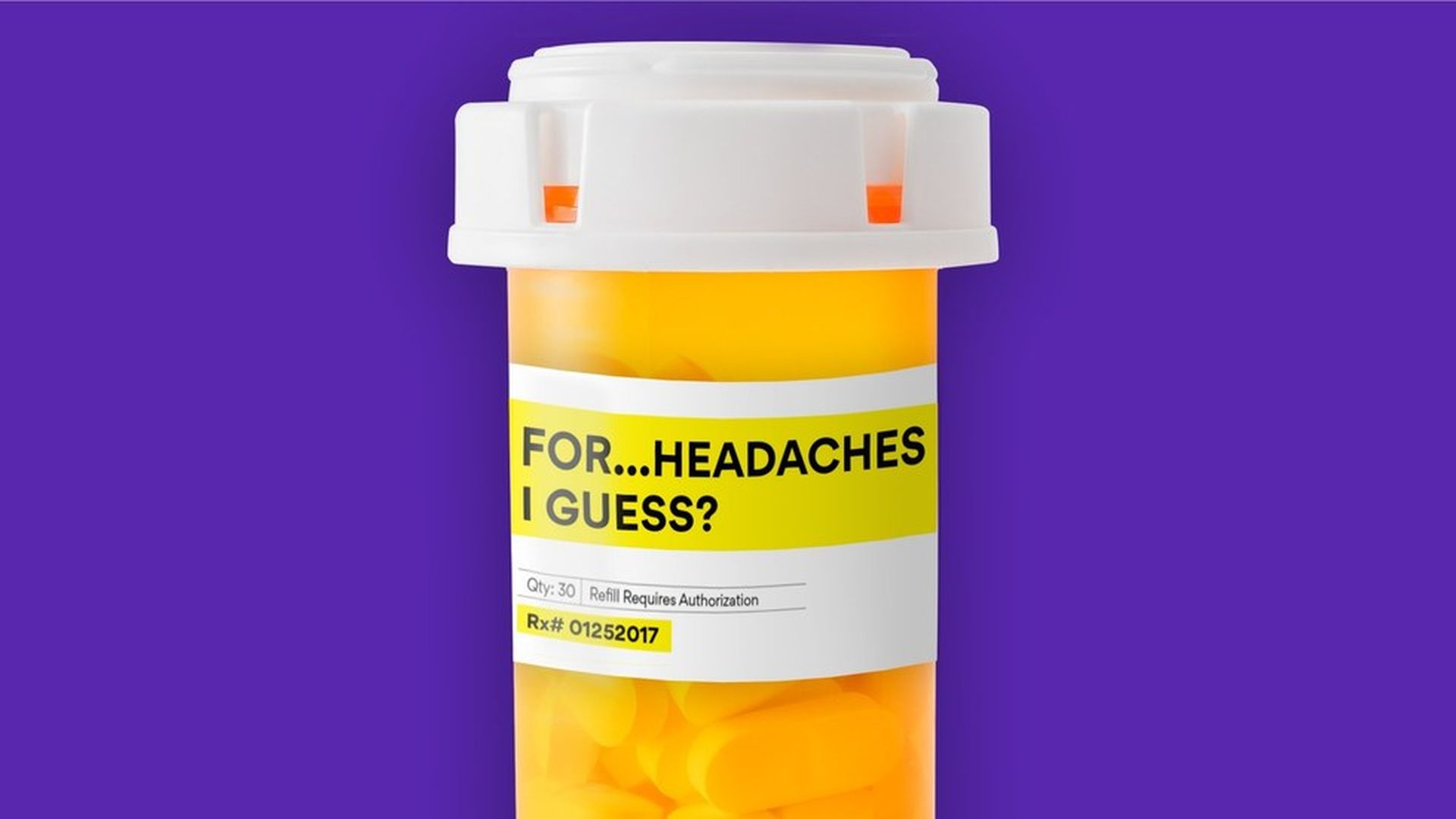The drug industry’s opinions about its products may soon be protected, too
Add Axios as your preferred source to
see more of our stories on Google.

Rebecca Zisser/Axios
As I wrote yesterday, the drug industry is likely soon to be free of its restrictions on off-label promotions. But it's actually looking at a bigger prize than just sending doctors dense medical journal articles about the potential benefits of off-label uses. It wants to be able to express opinions about its drugs — to doctors and even consumers — and have them be protected as free speech.
If that happens, experts say, watch out — because that gets rid of any incentive to do safety or effectiveness studies at all.
So far, the drug and device industry have been careful to assure skeptics that they only want the freedom to communicate "truthful" or "non-misleading" data-heavy information. They want to send it to doctors and to the insurance companies and pharmacy benefit managers that need the information to decide whether a drug should be covered.
But information directed just at doctors or other professionals is not a limit that their lawyers have conceded in claiming their First Amendment rights.
At a November hearing held by the Food and Drug Administration, Coleen Klasmeier, a lawyer representing a coalition of drug and device makers called the Medical Information Working Group, said that information about the off-label uses of drugs could also be given to consumers through the kinds of ads we now see on television and in magazines. "If it's truthful, then the constitution is agnostic as to audience," she declared.
"What we can do legally is not necessarily what responsible drug companies will do," Klasmeier told me yesterday. "Responsible, research-based drug companies are not looking to eviscerate the FDA."
Perhaps, but Klasmeier conceded that some in the industry could head down that path. "Could some small player, do it? Sure," she said.
In fact, even unambiguously truthful is not necessarily a requirement. Industry lawyers have also argued that if their clients' opinion is that a drug may be effective for an off-label use, they should be allowed to communicate it.
In fact, industry lawyers fighting the restrictions argue that even if the FDA does not believe the drug is effective, the company's expression of a contrary opinion would be constitutionally protected as long as the statement is made in good faith and does not include any incorrect facts.
Martin Redish, a professor at Northwestern Law School, was the first legal scholar to make the case for corporate First Amendment rights. Now a revered godfather of corporate free speech rights whose initially-obscure 1971 article in the George Washington University Law Review is almost always cited whenever these issues are litigated, Professor Redish works on the side for drug companies through an affiliation with Sidley & Austin, the same firm where Klasmeier is a partner.
"Corporate speech should have the same protection as individual speech; you should be allowed to express your opinion," Redish told me recently. Or, as he wrote in a 2011 article, co-authored by Klasmeier, in the American Journal of Law and Medicine: "If the First Amendment means anything, it prohibits government from suppressing one side of a political debate because it fears that the public might be convinced to make 'the wrong' choice."
Joshua Sharfstein, a former FDA Principal Deputy Commissioner and Maryland Secretary of Health, fears what will happen if lay people are given that choice.
At the same post-election FDA hearing where Klasmeier spoke, Sharfstein, now associate dean at Johns Hopkins School of Public Health, reminded his former colleagues of the "Thalidomide era" that preceded the current rules and pleaded for caution. (Thalidomide is the European-made sedative and morning sickness drug that caused horrible birth defects in the late 1950's.)
"Off-label promotion," he argued, "reduces the incentives for research to know what really works. If companies can get products sold without ever doing the definitive studies, everybody loses."
Last fall, the FDA said any written comments on the issue had to be submitted by Jan. 9. But in January, the deadline was extended until April 9. By that time it's likely, according to a drug industry lawyer who consulted with a member of the Trump transition team, that a wholesale pullback on the restrictions will be in the works, if it hasn't been announced already.
Robert Zirkelbach, a spokesman for the Pharmaceutical Research and Manufacturers of America, declined to comment on what specifically his group is doing to advance the cause — but he acknowledged that pulling back the regulations is part of the lobbying group's agenda.
"As the move towards a value-driven health care system accelerates, patients, caregivers, health care professionals and insurers need more information about the safety, effectiveness and full value of new medicines," he said. "But federal regulations governing information-sharing about medicines have not kept up with this new reality."
Unlike fighting off Medicare price negotiations or Canadian imports, this may be one area where Zirkelbach and PhRMA can relax. With the coming of a Trump Supreme Court appointee likely to support the trend toward corporate free speech and a new business-friendly FDA commissioner, it's clear that they only have to let another "new reality" run its course.
